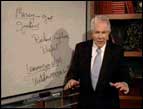

TEACHING
The First Amendment
Ladies and gentlemen, this controversy should never have happened. This ruling of the court should never have happened. The rulings of the Supreme Court should never have happened.
I talked with Supreme Court Associate Justice Thomas several years ago when he visited Regent University, and he said, "I read the First Amendment. It's clear."
Let me show you something. In the early days of this nation, we had 13 colonies, and those 13 colonies got together and formed a nation. Now of these, a number had established churches, and they did not want a national church, because they had their own churches. And so they said, "If we're going to ratify the First Amendment, you've got to have in there these words, and here they are. Congress shall make no law."
It doesn't say anything about Chief Justice Moore putting the Ten Commandments in the courthouse in Alabama. "Congress shall make no law," what, "respecting an establishment of religion." And what did that mean? It meant we didn't want another Anglican church in America like they had in England or we had here in Virginia. Massachusetts also had an established church. Congress shall not set up a national church. That's what it meant.
Later on, a man named Blaine, James Blaine, proposed what was called the Blaine Amendment. And the Blaine Amendment said we're going to take the entire Bill of Rights and apply it to the states. And the Blaine Amendment was voted down in Congress. Congress in those days said, "No way are you going to take the Bill of Rights and apply everything that is a restriction of the federal government and apply it to the states."
Do you see anything in here that says there shall be a separation of church and state? Let me show you precise language of the First Amendment: "Congress shall make no law respecting an establishment of religion or prohibiting the free exercise thereof." Now, if a federal judge comes in as an agent of Congress and prohibits the free exercise of religion, then he has violated the First Amendment.
There is nothing in the Constitution about separation of church and state. It doesn't exist. This is a fiction that has been created by courts over the last few years, and, as Jefferson said, by allowing them to interpret the Constitution we have come under the tyranny of an oligarchy. That's why we're praying that three of those judges will be led by God to step down, those liberals, so we can have three conservatives who will interpret the Constitution, not try to rewrite it.
That's what we're facing, ladies and gentlemen, and this incident in Montgomery, Alabama is just one more. The American Center for Law and Justice, which I'm pleased to be the president of, has 10 cases in the courts right now dealing with the Ten Commandments displays, and we've won several of them. And, although I disagreed with Judge Moore's judicial tactics, I didn't think they were very wise, I think his right to put the Ten Commandments in the courthouse is absolutely settled.
Plus, the United States Supreme Court is hypocritical. They start their meetings with prayer, but they say school students can't pray. But the courts say, "God bless this honorable court." I think that's a blasphemy to ask God to bless that bunch up there in that Supreme Court. In my opinion, it's blasphemy.
But secondly, they also have the Ten Commandments in their courtroom. So let's get jackhammers to the Supreme Court of the United States and cut those things out of there if we're going to be consistent with what the Supreme Court has said. But that's the national government, and they have the Ten Commandments.
This is the state government. The 13 states who formed our great nation never intended, when they ratified the First Amendment, to have these rulings that have been in effect over the last, really just a few decades. It's within the last 50 years. And ladies and gentlemen, it's time to declare ourselves free from judicial tyranny.
We uphold the rule of law, but tyrants should not be tolerated.
I can do all things through Christ who strengthens me.
—Philippians 4:13
—Philippians 4:13
© PatRobertson.com